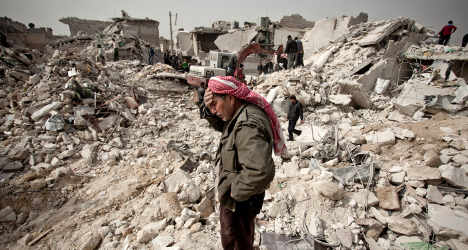Foreign Minister Emma Bonino has ruled out taking part without a UN Security Council mandate and says it would not be "automatic" even with such approval.
Government sources quoted in local media say Italy would also likely bar the use by third countries of air bases that played a pivotal role in Libya.
Italy is calling for UN inspectors to complete their work and anyone responsible for last week's alleged chemical weapons attack to be brought to justice.
"This very legalistic position is a departure from Italy's tradition of loyalty to Atlantic allies," said Jean-Pierre Darnis, an expert on Italian defence.
Several factors lie behind the policy, ranging from political weakness to concern about the fate of Christian minorities, experts said.
"Italy is prudent because it is weak," Vincenzo Nigro, a foreign policy specialist, said in an interview on the website of the La Repubblica daily.
"The slogan of [US President Barack] Obama seems to be: 'We have to do something, even if mistakes are made along the way'," Nigro said.
"Italy's is: 'It's better not to do anything even at the risk of mistakes and distancing ourselves from our traditional allies," he said.
Prime Minister Enrico Letta presides over an uneasy coalition with predecessor Silvio Berlusconi's party and tensions are particularly high now on the political scene because of the billionaire tycoon's legal woes.
Another factor behind the diplomatic caution could be because Italy is very involved in Lebanon, where it heads up the United Nations Interim Force.
"Syria is a piece in the puzzle that includes Lebanon, Jordan and Iraq and any action in Syria could destabilize Lebanon," said Silvia Colombo from the Institute for International Affairs in Rome.
Colombo said Italy was also looking at Christians.
"The fate of Christians, who are threatened by the rise of radical Islamism, is not marginal," she said.
Mindful of the exodus of Christians from Iraq, the Vatican has repeatedly called for more negotiations and a process of peace and reconciliation in Syria.
Marco Volpe, a Middle East expert from the Centre for International Studies, said Italy was "examining all possible consequences of an armed intervention for political and religious equilibriums in the region".
Darnis said there was also the issue of public opinion, which in Italy is "more realist" than elsewhere and remains solidly convinced that strikes against on Syria "will not resolve anything".
Britain, France or the United States could launch strikes "almost based on the decision of a single man" but Italy, like Germany, is a parliamentary democracy where the votes of lawmakers are essential.
Asked if Italy's position could evolve, as it did with Libya, to align with its allies, Darnis said it was a possibility particularly since Italy has "major interests" in the Middle East.
But he added that its more neutral position could also be a diplomatic card to play in the future if there are ever negotiations between the warring sides.
He said Bonino, a former European aid commissioner who knows the Middle East well and has studied Arabic, could be looking to position Italy in a more humanitarian role by staying above the military fray.


 Please whitelist us to continue reading.
Please whitelist us to continue reading.
Member comments